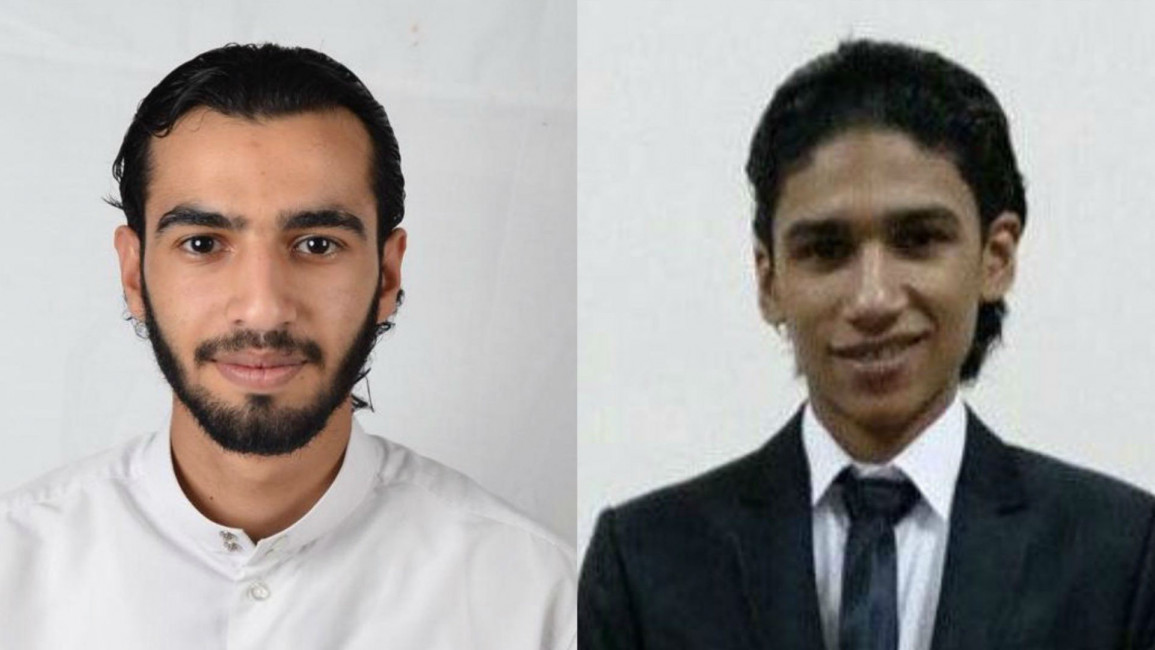Follow us on Twitter: @The_NewArab
Two men facing 'imminent execution' in Bahrain, Amnesty warns
Two men facing 'imminent execution' in Bahrain, Amnesty warns
The families of the two men on death row were suddenly called to visit the men in Jaw prison - raising alarms that their execution would soon follow.
3 min read
The two Bahraini men in their twenties could be executed within twenty-four hours [Getty]
Rights groups have called on Bahrain to stop the imminent execution of two men who are believed to have been forced to confess and faced an unfair trial.
Ali Mohamed Al-Arab, 25, and Ahmed Issa al-Malali, 24, could be executed within twenty-four hours by Bahraini authorities for a series of offences including "forming and joining a terrorist group".
The two Bahraini citizens were forced to confess after being tortured by security officers, according to rights groups. Al-Arab's toenails were ripped out and both were subject to electric shocks and beatings.
The UN Special Rapporteur on arbitrary executions Agnes Callamard called on Bahrain to immediately halt all plans in a Friday statement.
"I remind Bahrain that the only thing that distinguishes capital punishment from an arbitrary execution is full respect for the most stringent due process and fair trial guarantees," the statement read.
Lynn Maalouf, Middle East Research Director at Amnesty International, said: "If the Bahraini authorities go through with these executions it would be an utterly shameful show of contempt for human rights."
"The death penalty is an abhorrent assault on the right to life and the utmost cruel, inhuman and degrading punishment. Its use is appalling in all circumstances, but it is all the more shocking when it is imposed after an unfair trial in which the defendants were tortured to 'confess'."
Maalouf called on Bahrain's allies the US and UK to speak authorities out of the executions.
The families of al-Malali and al-Arab were suddenly summoned to visit the men in the notorious Jaw prison on Friday - raising alarms that their execution would soon follow.
Under Bahraini law, those waiting to be executed have the right to be visited by family the same day they are killed.
"If the executions are indeed imminent, then the king has committed a grave injustice by ratifying the death sentences of the two men despite the allegations of torture and other serious due process concerns," said Lama Fakih, acting Middle East director at Human Rights Watch.
"He should right the wrong by immediately revoking the death sentences."
The last time family members of Bahraini inmates on deathrow were called for a visit, the detainees were executed within a few hours.
Thirteen rights groups wrote a letter to Bahrain's King Hamad ibn Isa al-Khalifa in May about the cases of the two men.
The two men were convicted on terrorism charges and sentenced to death in a mass trail involving 60 people in January. They were separately arrested on 9 February 2017.
They may now face imminent execution after having exhausted all possible judicial appeals.
Ali Mohamed Al-Arab, 25, and Ahmed Issa al-Malali, 24, could be executed within twenty-four hours by Bahraini authorities for a series of offences including "forming and joining a terrorist group".
The two Bahraini citizens were forced to confess after being tortured by security officers, according to rights groups. Al-Arab's toenails were ripped out and both were subject to electric shocks and beatings.
The UN Special Rapporteur on arbitrary executions Agnes Callamard called on Bahrain to immediately halt all plans in a Friday statement.
"I remind Bahrain that the only thing that distinguishes capital punishment from an arbitrary execution is full respect for the most stringent due process and fair trial guarantees," the statement read.
Lynn Maalouf, Middle East Research Director at Amnesty International, said: "If the Bahraini authorities go through with these executions it would be an utterly shameful show of contempt for human rights."
"The death penalty is an abhorrent assault on the right to life and the utmost cruel, inhuman and degrading punishment. Its use is appalling in all circumstances, but it is all the more shocking when it is imposed after an unfair trial in which the defendants were tortured to 'confess'."
|
The families of al-Malali and al-Arab were suddenly summoned to visit the men in the notorious Jaw prison on Friday - raising alarms that their execution would soon follow.
Under Bahraini law, those waiting to be executed have the right to be visited by family the same day they are killed.
"If the executions are indeed imminent, then the king has committed a grave injustice by ratifying the death sentences of the two men despite the allegations of torture and other serious due process concerns," said Lama Fakih, acting Middle East director at Human Rights Watch.
"He should right the wrong by immediately revoking the death sentences."
The last time family members of Bahraini inmates on deathrow were called for a visit, the detainees were executed within a few hours.
Thirteen rights groups wrote a letter to Bahrain's King Hamad ibn Isa al-Khalifa in May about the cases of the two men.
The two men were convicted on terrorism charges and sentenced to death in a mass trail involving 60 people in January. They were separately arrested on 9 February 2017.
They may now face imminent execution after having exhausted all possible judicial appeals.
Bahrain, a small Gulf state and key US ally, has been gripped by bouts of unrest since 2011, when authorities cracked down on Shia-led protests demanding political reform.
Since then, hundreds of protesters have been jailed, with Bahrain claiming Iran trained and backed demonstrators in order to topple the Manama government - an accusation Tehran denies.
All opposition groups have been banned and disbanded.
Agencies contributed to this report.


![President Pezeshkian has denounced Israel's attacks on Lebanon [Getty]](/sites/default/files/styles/image_684x385/public/2173482924.jpeg?h=a5f2f23a&itok=q3evVtko)



 Follow the Middle East's top stories in English at The New Arab on Google News
Follow the Middle East's top stories in English at The New Arab on Google News


